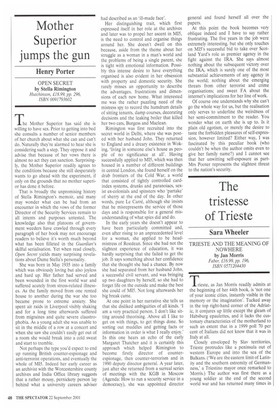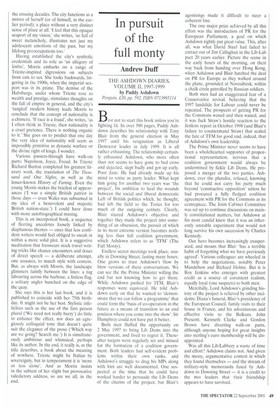The tristesse
of Trieste
Sara Wheeler
TRIESTE AND THE MEANING OF NOWHERE by Jan Morris Faber, 116.99, pp. 196, ISBN 0571204430 Trieste, as Jan Morris readily admits at the beginning of her 44th book, is 'not one of your iconic cities, instantly visible in the memory or the imagination'. Tucked away in the top right-hand corner of the Adriatic, it conjures up little except the gleam of Habsburg epaulettes, and it lacks the customary characteristics of the motherland to such an extent that in a 1999 poll 70 per cent of Italians did not know that it was in Italy at all.
Closely enveloped by Slav territories, Trieste protrudes like a peninsula out of western Europe and into the sea of the Balkans. ('We are the eastern limit of Latinity and the southern extremity of Germanness,' a Triestino mayor once remarked to Morris.) The author was first there as a young soldier at the end of the second world war and has returned many times in the ensuing decades. The city functions as a mirror of herself (or of himself, in the earlier period); a place without a very distinct sense of place at all. 'I feel that this opaque seaport of my vision,' she writes, `so full of sweet melancholy, illustrates not just my adolescent emotions of the past, but my lifelong preoccupations too.'
Having established the city's symbolic credentials and its role as 'an allegory of limbo', Morris embarks on a range of Trieste-inspired digressions on subjects from cats to sex. She looks backwards, lingering in the 1900s, when the imperial seaport was in its prime. The demise of the Habsburgs, under whom Trieste rose to wealth and prestige, stimulates thoughts on the fall of empire in general, and the city's 'tangled' modern history leads Morris to conclude that the concept of nationality is a chimera. If race is a fraud', she writes, 'as I often think in Trieste, then nationality is a cruel pretence. There is nothing organic to it.' She goes on to predict that one day the very idea of nationality will seem as impossibly primitive as dynastic warfare or the divine right of kings. I wonder.
Various passers-through have walk-on parts: Napoleon, Joyce, Freud. In Trieste Richard Burton completed his greatest literary work, the translation of The Thousand and One Nights, as well as the lesser-known History of Farting. Even the young Morris makes the briefest of appearances CI was a simple British patriot in those days — even Wales was subsumed in my idea of a benevolent and majestic British nation-state.') I could have done with more autobiographical musing.
This is an incorporeal book, a sequence of fleeting anecdotes loosely linked by diaphanous themes — ones that less confident writers would feel obliged to sneak in within a more solid plot. It is a suggestive meditation that forswears stock travel writing tricks like chance encounters and doses of direct speech — a deliberate attempt, one assumes, to match style with content. But, as always with Morris, the landscape glimmers faintly between the lines: a tug labouring across the harbour, a listless flag, a solitary angler hunched on the edge of the quay.
She says this is her last book, and it is published to coincide with her 75th birthday. It might not be her best. Stylistic infelicities such as the use of the first person plural (We need not really hurry') do little to enhance the effect, nor does an egregiously colloquial tone that doesn't quite suit the elegance of the prose ('Which way are we going? Search me.') It is simultaneously ambitious and whimsical, perhaps like its author. In the end, it really is, as the title describes, a book about the meaning of nowhere. Trieste might be Italian by sovereignty, but in temperament it is 'more or less alone'. And as Morris insists in the subtext of her slight but provocative valedictory address, so are we all, in the end.











































































 Previous page
Previous page